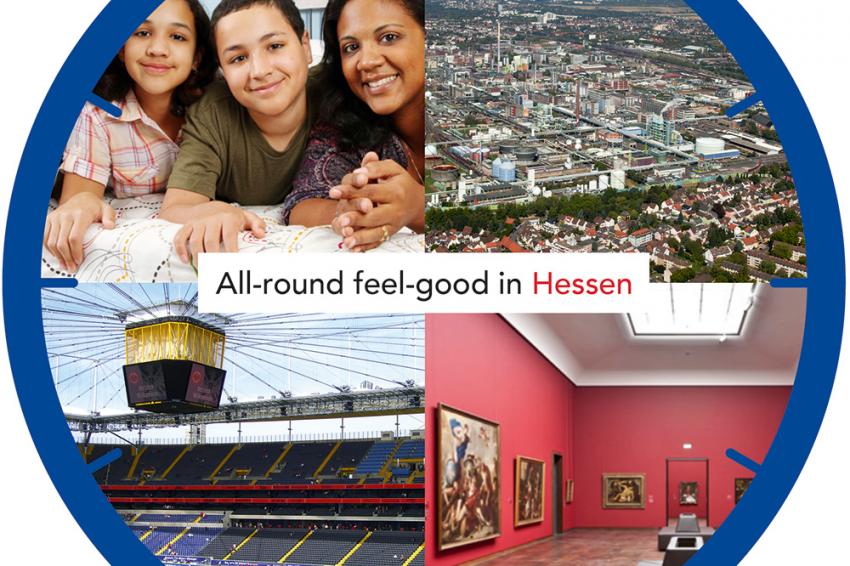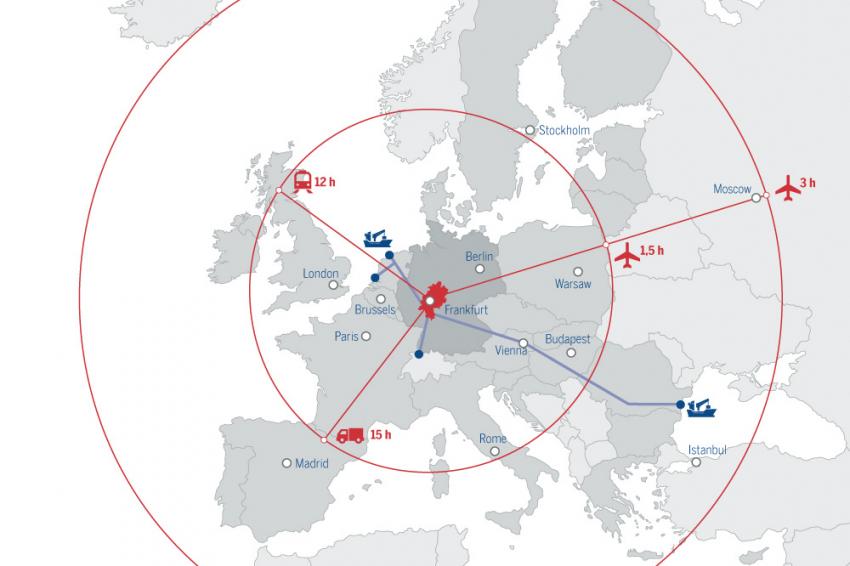Chemistry Works – at Every Level
Hesse Offers Ideal Infrastructure for Enterprises and their Employees at the Heart of Europe
More than 12,000 foreign companies have already chosen Hesse as the place to do business. A clear commitment to Europe’s most central location. Across all industries, employers, their staff and their families feel comfortable – while networks, clusters and expertise abound. Customers, culture, leisure - in Hesse nothing is ever far away. Challenges? A few, but none that cannot easily be solved. In international cooperation the role of Switzerland for example or Brexit are merely political idiosyncrasies; they are more than compensated for by years of experience, trust and understanding the needs of others.
For a chemical, pharmaceutical, biotech or medtech company many different aspects play a role in the selection of a location or in an investment decision: infrastructure and logistics, contacts with customers and between indigenous enterprises, proximity to user industries, access to well-educated personnel and knowledge-hungry graduates from colleges and universities as well as access to the capital market, and, of course … tradition. Hesse, located at the heart of Europe, can offer all of this. According to a study conducted by the EY Consultancy, Germany ranks number one in terms of European investment locations and, from the perspective of investors, number three worldwide, for the reasons mentioned. 16% of the population of the European Union live in Germany; they account for a disproportionate 21% of the gross domestic product of the EU and Hesse is among the most productive states in Germany.
Play in the Champions League
As the old saying goes – if you want to grow you need a role model. In 2014, Hesse exported goods worth more than €58 billion, two thirds of which were destined for Europe. Approximately 16% went to America and Asia. The international attractiveness of the region is reflected in the figures: In 2014 and 2015, 300 companies established themselves in Hesse, of which 14% were from the pharmaceutical, biotech, medtech, chemical and plastics sectors. More than half of the firms relocating came from the USA and China, followed by companies from the EU, Switzerland, Korea and Japan - and from the United Kingdom.
The following pioneering investments are worthy of note: Pharma giant Novartis is investing in a new production facility in Marburg for the manufacture of biopharmaceutical products. Swiss specialty chemicals group Clariant invested around €100 million in a research center in the Industrial Park Frankfurt Höchst. Industrial adhesives supplier Dymax Europe opened a new research and development laboratory in Wiesbaden. US pharmaceutical group Pharm-Allergan is now running its German business out of Frankfurt. Mitsubishi Polyester Film has set up a production facility for composite panels in the Kalle-Albert Industrial Park in Wiesbaden. And Australian biotherapeutics manufacturer CSL is investing over €240 million in a plasma fractionation facility as well as further notable sums in the expansion of its production capacity at its Marburg site. (cf. interview on page 16)
Digital and Real Networking
Looking outside the chemical industry; the leading Indian IT service provider Wipro Technologies has set up its new European Headquarters in Frankfurt: Digitization is part of the genetic code of Hesse with Frankfurt as the location of the world's largest data exchange point, DE-CIX.
Today, the importance of interdisciplinary and intercultural relations is a given, which means that at least the prerequisites have to be in place. This is clearly the case for Hesse as a look at current resident industries shows: The automotive industry and its suppliers, the optical industry, medical technology, diagnostics, pharmaceuticals and industrial biotechnology as well as service providers from analytics, clinical research and contract manufacturing. Once chemical companies are based locally they find plenty of B2B customers and, above all, cooperation partners.
Finding Partners and Talent
"In the Rhine-Main region, closeness to clusters and the regional Chambers of Commerce and trade associations should not be underestimated," said Dr. Martin Vollmer, Chief Technology Officer at Clariant, adding: "Many working groups from the German Chemical Industry Association, the German Chemical Society and Dechema -the Society for Chemical Engineering and Biotechnology are also available to us as a Swiss company in the immediate vicinity and one can meet their experts at numerous events to exchange ideas." (cf. interview on page 16)
The German Chemical Industry Association (VCI), the German Chemical Society (GDCh) and Dechema, the Society for Chemical Engineering and Biotechnology, are headquartered in Frankfurt am Main, as is the Central Association of the Electrical Engineering and Electronics Industry (ZVEI), the German Society for Materials Science (DGM), the Association of Biotechnology Companies (VBU), The German Industry Association for Biotechnology (DIB) and the Association of German Machinery and Plant Manufacturers (VDMA).
The Hessian colleges and research institutes of international renown are as much a part of the canon of cooperative partners as the universities of Frankfurt, Marburg and Giessen, as well as the Technical University in Darmstadt and the Darmstadt-based Fraunhofer Institute LBF.
As important as creative networking with companies from other industries and their logistical accessibility via land, water and air routes is, so too is the feel-good factor of a new environment. In this Hesse is at the forefront: With international children's day-care centers and schools with education in ten languages to ensure the integration of children, more than 180 international business and cultural clubs in Hesse facilitate digital, but above all, real coexistence between expatriates and local people. In Hesse the chemistry works – at every level!
Proximity to International Customers
In October 2013, Swiss specialty chemicals company Clariant inaugurated its new Clariant Innovation Center (CIC) in Frankfurt-Höchst, Germany. The CIC provides the group with an ultra-modern research hub. Dr. Martin Vollmer, Chief Technology Officer, Clariant, explains the reasons to locate the CIC in the Frankfurt area.
Why did Clariant invest €100 million in a Research Center in Hesse?
Dr. M. Vollmer: The decision to locate the Clariant Innovation Center (CIC) at the Frankfurt-Höchst Industrial Park was made for three reasons: the Rhine-Main region is one of Germany’s leading business locations and Frankfurt as an international metropolis is a magnet for domestic and foreign talents. We also have direct access to qualified young people. At the same time, Höchst was and still is Clariant's largest production and research center worldwide. In Höchst, we maintain the critical mass of 500 employees in research and development in order to develop innovative products on a sustained basis.
What sets the Industrial Park in Frankfurt Höchst apart from other locations?
Dr. M. Vollmer: The infrastructure, customer proximity and networking possibilities are unique. The Industrial Park perfectly combines transport by road, water and air, a plus when it comes to logistics. In connection with Infraserv, we benefit from excellent conditions in terms of energy supply and other services. The proximity to Frankfurt Airport is highly appreciated by our international customers and development partners, as it gives them a high degree of flexibility and meetings can be efficiently organized.
What role will the CIC play in Clariant’s future strategy?
Dr. M. Vollmer: The CIC is the flagship of the eight Clariant research centers around the world. We are interlinking Clariant’s four technology platforms: Chemistry & Materials, Biotechnology, Catalysis and Process technology. This allows us to pursue new directions in product and process development. As a leader in specialty chemicals, we will continue to invest in research in order to grow profitably.
Home of Life-saving Medicines
Behringwerke Marburg Industrial Park is a biotechnology center and host to16 innovative companies specializing in biotechnology and pharmaceutical production. The park is managed by Pharmaserv. Thomas Janssen, Managing Director, Pharmaserv, talks about the special features of the location.
What characterizes your location?
T. Janssen: More than 5,200 people work at our Behringwerke site in Marburg. Our focus is the pharmaceutical industry; we lease-out and operate production, laboratory and office space. Our customers value this clear focus, among them CSL from Australia, who produce therapeutic proteins, GSK from Great Britain who make vaccines, Novartis biotechnological products and Siemens as a manufacturer of diagnostic reagents.
How do you rate your connections and integration?
T. Janssen: We consider them excellent from many perspectives. The proximity to Frankfurt Airport is a location advantage for us since 50 percent of the freight we generate is international. Furthermore, we also offer our customers the services of a "Regulated Agent" and thus avoid time and cost-intensive checking of freight at the airport. As one of the largest industrial employers in the region, we are committed to the further development of the location and are a reliable partner not only for our customers, but also for politicians and authorities. Proximity to the Hessian universities is excellent and, in addition, Provadis supports on-site training in many specific occupational fields.
What is your view of the future?
T. Janssen: As an independent location operator, Pharmaserv has invested more than €100 million over the last decade, and our customers a multiple thereof. The Behringwerke location will continue to deliver reliable life-saving drugs and vaccines from Marburg to the world.
For more information about the Industry location Hesse
Online information and Events for Newcomers in Hesse








